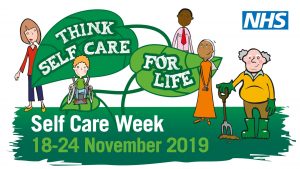#SelfCareWeek
This year, Self Care Week runs 18-24 November. It is an annual national awareness week that focuses on embedding support for self care across communities, families and generations. Think Self Care for Life is this year’s theme to help people “think” self care for a healthier, happier life. It is an important event in the diary of Connect Health, as it provides an opportunity to bring the message to a wider audience, and to reflect upon how best to engage with patients.
As Head of Patient Engagement at Connect Health, one of the main aspects of my role is to look at what we are doing in terms of engagement and to advise and challenge our offering, in order to ensure it reflects patient needs. The question I continually ask myself, in everything we do, is “how am I ensuring that patients, potential patients, carers/families and communities are at the centre”.
Patient engagement and self care
Self-Care is a vital facet of patient engagement – it is about empowering people to have confidence and the right information to support themselves better. Having greater control of one’s own health and wellbeing, particularly when one is challenged physically or mentally, will help you to manage your emotions, improve your quality of life, overcome fears and allow your mind, body and soul to be in sync. If you regularly practice self care techniques you will feel more in control, live a more balanced life and that gives you more energy.
Pain management
For MSK (musculoskeletal) patients, we provide many resources but some of the most powerful activities we recommend is a group intervention that aims to help people with persistent pain to manage their pain, increase their activity and improve their quality of life and wellbeing. Its aim is to help people to live a happier and more meaningful life, despite and with your pain.
Achieving enhanced patient engagement
I’m working on a framework and a toolkit to guide our service managers and colleagues in order to enhance our public and patient engagement through new initiatives and an adapted version of the NHS’s “Ladder of Engagement and Participation”. For me, self care is embedded within each stage of the ladder.
Top Five Tips for patient engagement
Informing – providing communities and individuals with information to help them understand alternatives and opportunities – our website provides a lot of information about our services
Consulting – asking communities or individuals to feedback on work we have carried out, doing surveys and focus groups
Involving – working directly with communities and patients to make sure we understand concerns and aspirations and that we are constantly seeking involvement to inform policies through service participation, partnership boards etc.
Collaborating – working with already established partnerships and communities to involve patients in each aspect of our decisions for example, if we are looking at developing new services
Evolving – whilst the NHS ladder is entitled Devolving, it’s important to consider flexibility and the continuing waves of change within patient engagement and the healthcare environment that is evolving. This will undoubtedly underpin the messages of empowerment and self-care, inspiring patients to engage and empower patients to take responsibility about their care
Reflecting on my role
One of the biggest things I’ve found in my 5 months working with Connect Health is a strong dedication to patient engagement which is evidenced through the commitment they have made to my role. If you look at it through the lens of the organisation’s values
- Connect strives to be Pioneering in the creation of a culture of engagement, whose patient and public involvement is central to the delivery of healthcare services.
- Being Dynamic is also key, whereby Connect is constantly evolving patient engagement strategies to reflect the challenges and flexibly tailoring services to meet the needs of our diverse populations.
- In terms of Quality, the appropriate delivery of the right care at the right time and in right place is vital, with patient feedback loops, CQC compliant standards and outstanding outcomes.
- Finally in terms of People Centred, there is a shift from patient engagement as ‘something we should do a bit more of’ to ‘central to everything we design and deliver as an organisation’ and to always look at patient engagement and involvement through equality, diversity and inclusivity lens.

The result should be a life long approach to self care and empowerment.
*The slogan “A dog is for life, not just for Christmas” was founded in 1978 by Clarissa Baldwin OBE, chief executive, the Dog’s Trust.
Further reading
http://www.selfcareforum.org/events/self-care-week/
Patient resources

